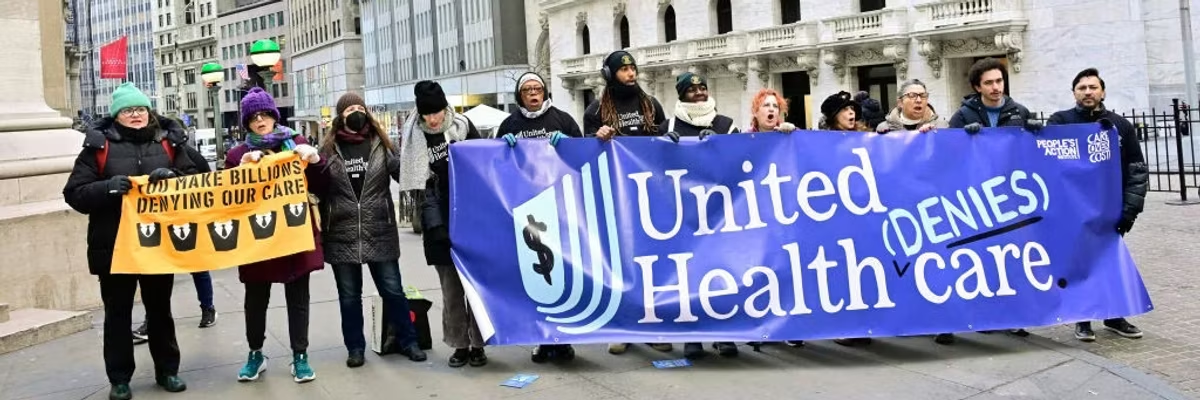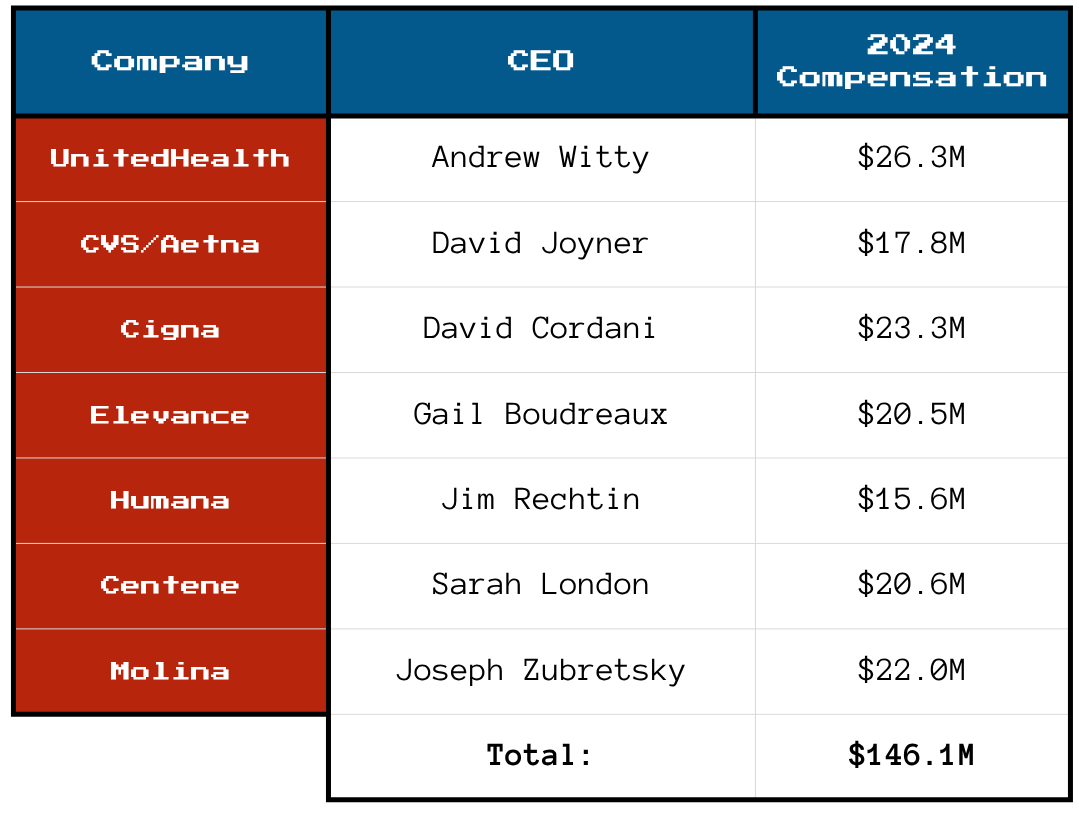

SUBSCRIBE TO OUR FREE NEWSLETTER
Daily news & progressive opinion—funded by the people, not the corporations—delivered straight to your inbox.
5
#000000
#FFFFFF
To donate by check, phone, or other method, see our More Ways to Give page.


Daily news & progressive opinion—funded by the people, not the corporations—delivered straight to your inbox.

Patients and doctors denounce UnitedHealth on the steps of Wall Street on January 16, 2025 in New York City.
Meanwhile, 17% of Americans say they're using buy now, pay later services for medical or dental care.
The seven largest publicly traded U.S. health insurance companies made a collective $71.3 billion in profits last year, and their CEOs took home a total of $146.1 million in compensation, according to an analysis released Wednesday by an ex-industry executive.
Wendell Potter, a former vice president for corporate communications at Cigna who now leads the nonprofit Center for Health and Democracy, compiled the data ahead of his recent testimony before the Senate Committee on Health, Education, Labor, and Pensions.
As Potter detailed for his newsletter, Health Care un-covered, the companies—UnitedHealth, CVS/Aetna, Cigna, Elevance, Humana, Centene, and Molina—boosted their profits by more than half a billion dollars from 2023 to 2024.

Alongside a chart detailing the companies' 2023 and 2024 revenues and profits, Potter published one showing each CEO's compensation. He also pointed out that their collective take-home pay is "enough to cover annual premiums for thousands of American families."

"So, what's driving the revenue surge?" Potter wrote. "Gouging. Insurers continued to jack up premiums for their commercial customers and overcharge the government."
He highlighted how investigations have exposed rampant fraud and upcoding with private Medicare Advantage plans and noted that "Medicaid managed care is a gold mine, too."
Potter further noted that "to the dismay of shareholders, the big seven insurers have had to admit that so far in 2025, they've paid more medical claims than they had expected, which means their profits were down somewhat during the first months of the year."
The expert warned that the American public should "expect even more financial pain (and difficulty getting the care you need) as these companies do all they can to get their profit margins back to where Wall Street wants them."
His warning comes as new polling makes clear that Americans are already feeling the pain from healthcare bills. Results released Monday by the Associated Press-NORC Center for Public Affairs Research show that 17% of U.S. adults have used buy now, pay later services for medical or dental care.
Most Americans are also stressed by healthcare costs. According to the poll, 42% of adults identified that as a major stressor, and another 36% said it's a minor stressor. Other sources of stress include grocery prices, housing, savings, and wages.
Healthcare could become an ever bigger source of stress soon, as Republicans' recently signed budget reconciliation package starts to strip millions of people of their insurance coverage, thanks to the law's attacks on Medicaid and the Affordable Care Act (ACA).
"Cuts to the ACA will raise premiums for almost 23M Americans by hundreds of dollars each year," Congressman Ro Khanna (D-Calif.) said on social media Monday. "Working and middle-class families can't afford that. We need to pass Medicare for All and make sure health insurance stays affordable for all Americans."
While more than 100 Democratic members of the U.S. House of Representatives and over a dozen senators support the Medicare for All Act, led by Rep. Pramila Jayapal (D-Wash.) and Sen. Bernie Sanders (I-Vt.), the proposal remains opposed by not only Republicans—who control both chambers—but also some corporate Democrats.
Dear Common Dreams reader, The U.S. is on a fast track to authoritarianism like nothing I've ever seen. Meanwhile, corporate news outlets are utterly capitulating to Trump, twisting their coverage to avoid drawing his ire while lining up to stuff cash in his pockets. That's why I believe that Common Dreams is doing the best and most consequential reporting that we've ever done. Our small but mighty team is a progressive reporting powerhouse, covering the news every day that the corporate media never will. Our mission has always been simple: To inform. To inspire. And to ignite change for the common good. Now here's the key piece that I want all our readers to understand: None of this would be possible without your financial support. That's not just some fundraising cliche. It's the absolute and literal truth. We don't accept corporate advertising and never will. We don't have a paywall because we don't think people should be blocked from critical news based on their ability to pay. Everything we do is funded by the donations of readers like you. Will you donate now to help power the nonprofit, independent reporting of Common Dreams? Thank you for being a vital member of our community. Together, we can keep independent journalism alive when it’s needed most. - Craig Brown, Co-founder |
The seven largest publicly traded U.S. health insurance companies made a collective $71.3 billion in profits last year, and their CEOs took home a total of $146.1 million in compensation, according to an analysis released Wednesday by an ex-industry executive.
Wendell Potter, a former vice president for corporate communications at Cigna who now leads the nonprofit Center for Health and Democracy, compiled the data ahead of his recent testimony before the Senate Committee on Health, Education, Labor, and Pensions.
As Potter detailed for his newsletter, Health Care un-covered, the companies—UnitedHealth, CVS/Aetna, Cigna, Elevance, Humana, Centene, and Molina—boosted their profits by more than half a billion dollars from 2023 to 2024.

Alongside a chart detailing the companies' 2023 and 2024 revenues and profits, Potter published one showing each CEO's compensation. He also pointed out that their collective take-home pay is "enough to cover annual premiums for thousands of American families."

"So, what's driving the revenue surge?" Potter wrote. "Gouging. Insurers continued to jack up premiums for their commercial customers and overcharge the government."
He highlighted how investigations have exposed rampant fraud and upcoding with private Medicare Advantage plans and noted that "Medicaid managed care is a gold mine, too."
Potter further noted that "to the dismay of shareholders, the big seven insurers have had to admit that so far in 2025, they've paid more medical claims than they had expected, which means their profits were down somewhat during the first months of the year."
The expert warned that the American public should "expect even more financial pain (and difficulty getting the care you need) as these companies do all they can to get their profit margins back to where Wall Street wants them."
His warning comes as new polling makes clear that Americans are already feeling the pain from healthcare bills. Results released Monday by the Associated Press-NORC Center for Public Affairs Research show that 17% of U.S. adults have used buy now, pay later services for medical or dental care.
Most Americans are also stressed by healthcare costs. According to the poll, 42% of adults identified that as a major stressor, and another 36% said it's a minor stressor. Other sources of stress include grocery prices, housing, savings, and wages.
Healthcare could become an ever bigger source of stress soon, as Republicans' recently signed budget reconciliation package starts to strip millions of people of their insurance coverage, thanks to the law's attacks on Medicaid and the Affordable Care Act (ACA).
"Cuts to the ACA will raise premiums for almost 23M Americans by hundreds of dollars each year," Congressman Ro Khanna (D-Calif.) said on social media Monday. "Working and middle-class families can't afford that. We need to pass Medicare for All and make sure health insurance stays affordable for all Americans."
While more than 100 Democratic members of the U.S. House of Representatives and over a dozen senators support the Medicare for All Act, led by Rep. Pramila Jayapal (D-Wash.) and Sen. Bernie Sanders (I-Vt.), the proposal remains opposed by not only Republicans—who control both chambers—but also some corporate Democrats.
The seven largest publicly traded U.S. health insurance companies made a collective $71.3 billion in profits last year, and their CEOs took home a total of $146.1 million in compensation, according to an analysis released Wednesday by an ex-industry executive.
Wendell Potter, a former vice president for corporate communications at Cigna who now leads the nonprofit Center for Health and Democracy, compiled the data ahead of his recent testimony before the Senate Committee on Health, Education, Labor, and Pensions.
As Potter detailed for his newsletter, Health Care un-covered, the companies—UnitedHealth, CVS/Aetna, Cigna, Elevance, Humana, Centene, and Molina—boosted their profits by more than half a billion dollars from 2023 to 2024.

Alongside a chart detailing the companies' 2023 and 2024 revenues and profits, Potter published one showing each CEO's compensation. He also pointed out that their collective take-home pay is "enough to cover annual premiums for thousands of American families."

"So, what's driving the revenue surge?" Potter wrote. "Gouging. Insurers continued to jack up premiums for their commercial customers and overcharge the government."
He highlighted how investigations have exposed rampant fraud and upcoding with private Medicare Advantage plans and noted that "Medicaid managed care is a gold mine, too."
Potter further noted that "to the dismay of shareholders, the big seven insurers have had to admit that so far in 2025, they've paid more medical claims than they had expected, which means their profits were down somewhat during the first months of the year."
The expert warned that the American public should "expect even more financial pain (and difficulty getting the care you need) as these companies do all they can to get their profit margins back to where Wall Street wants them."
His warning comes as new polling makes clear that Americans are already feeling the pain from healthcare bills. Results released Monday by the Associated Press-NORC Center for Public Affairs Research show that 17% of U.S. adults have used buy now, pay later services for medical or dental care.
Most Americans are also stressed by healthcare costs. According to the poll, 42% of adults identified that as a major stressor, and another 36% said it's a minor stressor. Other sources of stress include grocery prices, housing, savings, and wages.
Healthcare could become an ever bigger source of stress soon, as Republicans' recently signed budget reconciliation package starts to strip millions of people of their insurance coverage, thanks to the law's attacks on Medicaid and the Affordable Care Act (ACA).
"Cuts to the ACA will raise premiums for almost 23M Americans by hundreds of dollars each year," Congressman Ro Khanna (D-Calif.) said on social media Monday. "Working and middle-class families can't afford that. We need to pass Medicare for All and make sure health insurance stays affordable for all Americans."
While more than 100 Democratic members of the U.S. House of Representatives and over a dozen senators support the Medicare for All Act, led by Rep. Pramila Jayapal (D-Wash.) and Sen. Bernie Sanders (I-Vt.), the proposal remains opposed by not only Republicans—who control both chambers—but also some corporate Democrats.